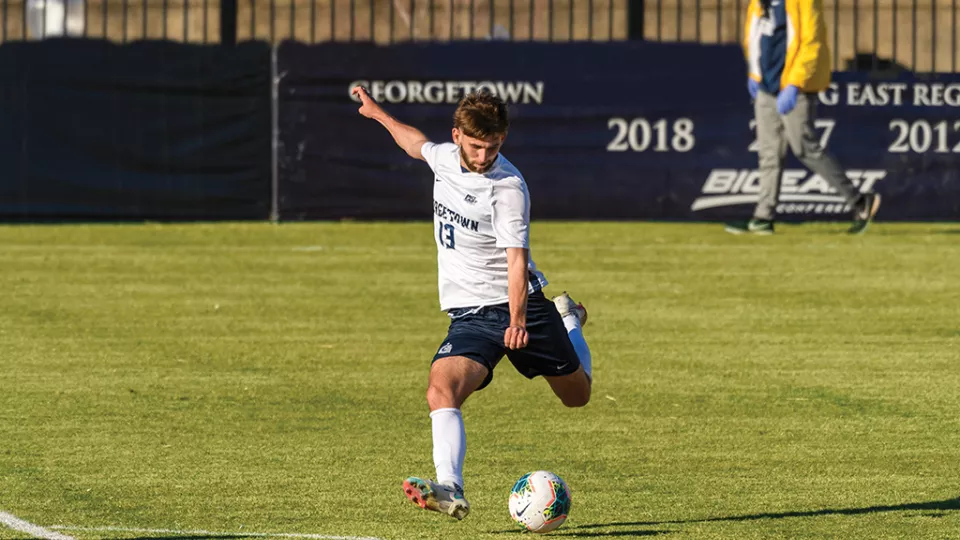
A Winning Assist in Fighting Pediatric Cancer
It’s just past noon on a spring-like Tuesday in early March in Washington, D.C., and Chris Hegardt is about to run out from his dorm to grab a quick lunch. From there, he’ll be heading across the Georgetown University campus for soccer practice.
The 19-year-old freshman is a center midfielder for Georgetown—one of the top NCAA Division I soccer teams in the country and the 2019 NCAA men’s national champions. But at the moment, Chris is talking about philanthropy, not sports.
“It means a lot that our family has the opportunity to give back,” he says. “It feels really good to help out others.”
—Kim Hegardt, Chris’ mom and President of the Names Family Foundation
Chris is referring to the Names Family Foundation, which was started in 1996 by his great-grandparents, Scott and Evelyn (Sis) Names, in Tacoma, Washington. The foundation supports health and wellness through athletics and physical education, mostly in the Tacoma area. But it also has spent nearly a decade giving to a cause very close to his family’s heart: Children’s Hospital Los Angeles.
“We are forever grateful to Children’s Hospital Los Angeles,” says Chris’ mom, Kim Hegardt, President of the Names Family Foundation and a member of the CHLA Foundation Board of Trustees. “If we hadn’t found Dr. Mascarenhas, I don’t think Chris would be alive today.”
Recently, the foundation gave its second $1 million gift to support the Names Family Foundation Early Phase Clinical Trials Program in the Cancer and Blood Disease Institute at CHLA.
“Research is a core focus at Children’s Hospital Los Angeles, and I am deeply grateful to the Names Family Foundation for its generous support,” says Paul S. Viviano, President and CEO of Children’s Hospital. “The family’s story is an incredible example of how our institution’s expertise and commitment to advancing pediatric cancer research can make all the difference in a child’s life. In turn, the foundation’s philanthropy has supported further study that allows our scientists to contribute new knowledge to the field.”
A fateful hit
Even as a young boy, Chris’ abilities on the soccer field attracted attention. One of his coaches once told ESPN.com that he believed Chris was one of the best players in his age group—in the entire country.
Chris was obsessed with the sport. He slept in his uniform the night before games, and he spent endless hours kicking and dribbling the ball in the backyard of the family’s Fallbrook, California, home.
But on Dec. 5, 2009, at a weekend tournament in San Diego, Chris’ life took an unthinkable turn.
With 15 minutes to go in the team’s first game, a ball hit Chris, then 7, straight in the stomach—hard. He collapsed.
—Leo Mascarenhas, MD, MS
Deputy Director of the Cancer and Blood Disease Institute at CHLA
On the sidelines, he was having trouble breathing and was sick to his stomach. His dad, Ron Hegardt, took him to a nearby emergency room.
A scan revealed stunning news: Chris’ liver was riddled with cancerous tumors. The soccer ball had ruptured one of them, and he was bleeding internally. He underwent emergency surgery to stop the bleeding at a San Diego hospital, and doctors broke the news to his parents.
“It was a conversation like, ‘Sorry to have to tell you this,’” remembers Ron. “It wasn’t, ‘He’s got cancer and we’re going to beat it.’ It was … almost like a death sentence. We weren’t prepared for that. No parent is prepared for that.”
Unfortunately, doctors could not determine what kind of liver cancer Chris had. The Hegardts were willing to go anywhere in the world to find an expert who could help. As it turned out, that expert was Leo Mascarenhas, MD, MS—and he was only a couple of hours away at Children’s Hospital Los Angeles.
Dr. Mascarenhas, Deputy Director of the Cancer and Blood Disease Institute at CHLA, was “99.99% sure” that Chris had an extremely rare form of liver cancer that had only recently been described in scientific literature. He had treated a handful of children with that cancer, and he knew of a few cases in Europe.
“He laid out a plan for us, not around extending life but around trying to save his life,” Ron says. “We left that night and said, ‘This is where we’re going.’”
At CHLA, Chris underwent three months of chemotherapy and received a lifesaving liver transplant performed by Yuri Genyk, MD, now Chief of the Division of Abdominal Transplantation at CHLA. After three more months of chemotherapy, Chris completed his treatment. His cancer was gone.
The next month, he was back on the pitch. And by March 2011—a year after his transplant—he was nailing a clutch, game-tying penalty kick with just minutes to go in the State Cup final, the biggest soccer tournament in California. His team, the San Diego Surf, won the title.
Chris was named Most Valuable Player.
Advancing new treatments
Soon after Chris’ treatment, Kim and Ron looked for ways to give back to the hospital that had saved their son’s life. The Names Family Foundation was the perfect vehicle.
Scott and Sis Names were Kim’s grandparents, and both had been lifelong sports enthusiasts. Coming from humble beginnings, Scott and Sis married during the Great Depression and started a successful sporting goods store near Tacoma. In 1971, they became early investors in a start-up athletic shoe company in Oregon that became a global giant: Nike.
Scott and Sis channeled their business success into helping others. Kim and Ron wanted to do the same thing: express their gratitude for Chris’ recovery by helping to advance cancer treatment for other children.
—Chris Hegardt
Initially, the Names Family Foundation supported Dr. Mascarenhas’ research into pediatric liver cancers. The support gave him the funding he needed to conduct the largest case study to date on hepatocellular malignant neoplasm-NOS (HEMNOS)—the rare cancer Chris had. The resulting paper, published in 2017, more clearly defined the cancer and outlined the successful treatment strategy used at CHLA.
“Previously these patients were thought to do poorly, but our patients had all done well and achieved remission,” Dr. Mascarenhas says.
In 2016, the foundation expanded its support with a $1 million gift establishing the Names Family Foundation Early Phase Clinical Trials Program in the Cancer and Blood Disease Institute. Recently, the foundation continued its commitment with another $1 million gift to the program.
“This funding is really instrumental in bringing new treatments to patients who need them the most—those who have relapsed or who are not responding to standard therapies,” explains Dr. Mascarenhas, who leads the program.
Many of the trials are developed and initiated by investigators at Children’s Hospital Los Angeles. The novel therapies being tested—for solid tumors and leukemias—are also designed to be less toxic than traditional regimens. Current trials include studies on immunotherapy and therapies that target cancer-specific genetic alterations.
“Finding avenues that go beyond chemotherapy and use your own body to heal, your own immune system—that’s exciting,” says Kim. “We are thrilled to support this important research.”
Dr. Mascarenhas is also continuing to study HEMNOS and other pediatric liver cancers. The next step: conduct genetic analysis on these tumors to try to predict how patients will respond to treatment. The goal is to boost treatment effectiveness in children who are less likely to respond.
“Philanthropic support is what really helps us to get new discoveries into patients,” he adds. “Ultimately, that is what is going to move the field forward.”
Going for his goal
For Dr. Mascarenhas, seeing Chris achieve his dreams on the soccer field is the ultimate reward.
“It’s why I do what I do,” he says simply.
Chris, meanwhile, has continued to play soccer at the highest levels. He spent two years as a starter for the Seattle Sounders FC Academy team and played with the Seattle Sounders professional team during the 2020 preseason. As a freshman at Georgetown, he scored two game-winning goals in the first four games of 2021—including one that earned him Big East Freshman of the Week honors.
Chris has never let his early experience with cancer dampen his ambitions. Looking ahead, his next goal is to become a pro soccer player after college. “I’ve always loved soccer,” he says. “I’ve been playing for so long, it feels like my life.”
Getting hit by that soccer ball all those years ago very likely saved his life—identifying a hidden cancer before it had spread to other organs. But he admits that, at age 7, he didn’t understand the gravity of what was happening. And that was a good thing.
“I just thought about it like, it’s just a little bump in the road,” he says. “I had the right mindset—that you can overcome anything.”


